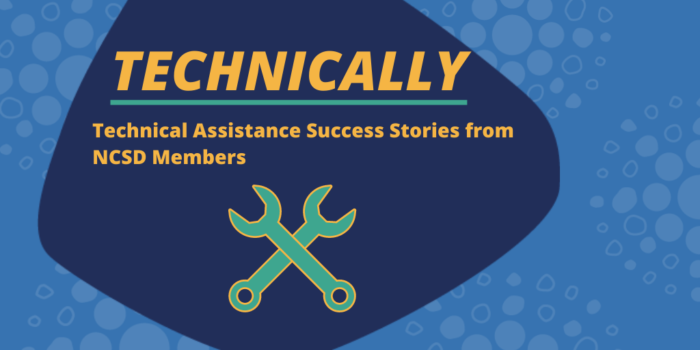Technically: VCA Training
In this week's edition of Technically, Emily Fussell shares how she worked with NCSD to create and facilitate a virtual VCA training for DIS.

What challenge did you identify?
As the supplemental Disease Intervention Specialist (DIS) grant funding from CDC rolled out to jurisdictions this past year, many STD programs struggled to find adequate training resources available to prepare their new DIS workforce to respond to the syphilis increases in the United States. Without the CDC Passport to Partner Services, which was eliminated in 2019, and other training services lagging behind in completion due to the COVID-19 pandemic, jurisdictions have been placed into the position where they have to find creative solutions to training their new DIS workforce.
Additionally, some DIS skills, previously taught by the experts of Passport to Partner Services during the in-person training sessions, have not been taught to new workforce because there are not certified trainers within these jurisdictions. While most DIS skills can be taught by a seasoned peer, some more complex skillsets – like Visual Case Analysis (VCA) — require a certified trainer to facilitate an effective training.
Frustrated and in-need, jurisdictions have been posting on MyNCSD, a forum designed to bring members of STD Prevention jurisdictions together, for information on DIS training materials that could be used in their jurisdictions while they await federal DIS training initiatives to be completed. Through this forum, it became clear that one skillset was in desperate need across the country: VCA.
When I saw a request for VCA training, I shared the week-long DIS Training course I curated during my years at the Indiana Department of Health, based on the Passport to Partner Services course and informed by the VCA “Train the Trainer” training I received from the CDC in the fall of 2019. This provided the in-need jurisdiction a solid, trusted place to start for VCA training and gave them the ability to tailor the training to meet their jurisdiction’s need.
Soon, the requests were flooding my inbox. Over ten jurisdictions emailed me after I responded to the original MyNCSD post with my information and resources available to be shared, and it was at that time I recognized the need for a broader, more formal, and updated training.
What specific technical assistance tools and resources did you work with NCSD on? How did you use the tools and resources to address the identified challenge?
When I got this flood of requests, I reached out to Talia Parker of NCSD and floated the idea of creating a more formal VCA training to support the STD jurisdictions who expressed a need in this area. As one jurisdiction explained to me, this was a critical skill that was being lost due to the lack of Passport to Partner Services support and training available to DIS. I felt personally compelled to address this issue given my history in the field with DIS training.
NCSD was extremely enthusiastic about this project, and we worked together for several months to develop the VCA training, rounding it out to be a stand-alone training that could be electronically delivered in an on-demand fashion. The session was delivered to a virtual audience of 50 DIS and included a live practice session where the attendees practiced along with me while we worked through mock exercises. The recorded training is now archived as a component of DIS training and resources on the NCSD website.
How can others work with NCSD to create the resources and tools they need?
If you are interested in championing change or creating resources derived from your expertise, my advice is to stay connected to NCSD via the website and newsletters, and regularly interact with colleagues, friends, and new network connections via the MyNCSD forum. If you have the time available, serve on relevant advisory boards and have your voice heard. NCSD does an incredible job anticipating the needs of the field and getting resources gathered at a moment’s notice, but it is confident experts who feel hungry to take on challenges and create the items needed for a well-trained DIS workforce that make all the difference.
My advice is to never be afraid to reach out to your NCSD liaison or trusted contact, or to post your questions on the MyNCSD forum. There are no stupid questions or suggestions (I can guarantee you someone, somewhere, has the same exact concern or question you do) and NCSD is dedicated to addressing real-life needs identified in the field. Utilizing MyNCSD is one the best ways to stay in touch with seasoned experts in the field, giving you a pathway to rely on for information when you need it most. Afterall, who knows you better than another DIS, another STD Director, another STD Prevention expert? Our experiences in the field are unique, and we can utilize this forum to rely on each other for additional training items in this unprecedented time of public health.
For TA questions, please contact Talia Parker, Charlie Rabins, or Leo Parker.